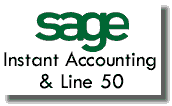 |
|
|
Sage
Accounting (Line 50) UK's most popular PC based accounting solution for small and medium-sized businesses. The range includes Stock Control, Invoicing, Sales & Purchase Order Processing and e-banking. Compatible with Sage e-business solutions. Single or multi-user. |
With Three levels of training to choose from we can accommodate the beginner to advanced users |
||
| INTRODUCTION TO SAGE ACCOUNTING DURATION: One Day
For those who
are deciding whether to computerise their accounting records and
for those who have decided and want to learn how to get started.
The teaching approach contains a mix of lectures and hands on experience operating a Sage computer package with practical examples.
Elementary knowledge of bookkeeping systems either manual or computerised. Theory of bookkeeping would be useful if practical experience has not been gained.
By the end of the course, delegates should be able to: 1. Install
Sage Package onto the computer.
SAGE ACCOUNTING INTERMEDIATE LEVEL
Those with a working knowledge of a Sage computerised system who wish to further develop their knowledge of what the Sage program can do for them.
The teaching approach contains a mix of lectures and practical hands on experience operating a Sage computer package based on practical examples.
Ideally the course delegates will have attended the introduction to Sage accounting or have a previous knowledge of operating a Sage accounting package.
By the end of the course, delegates should be able to: 1. Raise sales
invoices. SAGE ACCOUNTING ADVANCED LEVEL
For those with a detailed knowledge of the Sage computerised accounting package who wish to fine tune their knowledge by using the whole system.
The teaching approach contains a mix of lectures and practical hands on experience operating a Sage computer package with practical examples.
The course delegates will ideally have attended the Sage Accounting Intermediate level and be confident with the operation of the Sage Accounting package.
By the end of the course, delegates should be able to: 1. Input a
budget for a business onto Sage. Critical Skills (UK) LTD
Tapton Park Innovation Centre Brimington Road Chesterfield Derbyshire S41 0TZ Tel : +44 (0) 1246 557 873 Fax : +44 (0) 1246 230 055 information@critical-skills.co.uk
|
|||

